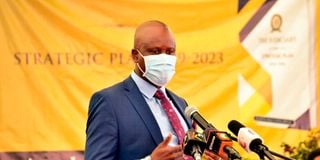Breaking News: At least 10 feared to have drowned in Makueni river
MPs faulted over lack of public participation in budget making

Parliamentary Budget and Appropriations Committee chair Kanini Kenya, during the launch of the Performance Management and Measurement Understandings Evaluation Report 2018/19, at the Supreme Court of Kenya on August 6, 2020.
What you need to know:
- International Budget Partnership (IBP) Kenya claims that the National Assembly made a wrong move that will likely put the legitimacy of the budget into question.
Budget experts have faulted the National Assembly for passing the 2021 Budget Policy Statement (BPS) without conducting the mandatory public participation, as provided for in the Constitution and the Public Finance Management (PFM) Act.
International Budget Partnership (IBP) Kenya claims that the National Assembly, in adopting the report of the Budget and Appropriations Committee (BAC) on the BPS last week, made a wrong move that will likely put the legitimacy of the budget into question.
IBP's country manager, Dr Abraham Rugo, and chief executive James Muraguri said they will be forced to have the issue challenged in court in the coming days.
“In total disregard of constitutional provisions, the budget committee made recommendations and tabled the report for approval without calling for public input. This is a wrong turn,” Dr Rugo says in an open letter to the National Assembly.
“We find it surprising that the House would allow such a critical document to be introduced for approval without an open and inclusive public participation."
Budget details
Under the 2021 BPS, the government wants to spend Sh3.02 trillion in the 2021/22 financial year. This budget will see the 47 county governments allocated Sh409.88 billion, inclusive of an equitable share of Sh370 billion and conditional grants.
The document imposes on the national government an expenditure ceiling of Sh1.31 trillion (recurrent) and Sh658.94 billion (development).
The Parliamentary Service Commission, which manages Parliament's affairs, has a ceiling of Sh37.88 billion while that of the Judiciary is set at Sh17.92 billion.
Further, the BPS projects the Kenya Revenue Authority (KRA) will collect revenue of not less than Sh2.03 trillion with the ordinary revenue target set at Sh1.78 trillion.
Mr Muraguri asked the Parliament Budget Office (PBO) to up its game by providing the required advisory to the Budget committee as provided for in the Constitution.
“Coming at a time when the country is under severe financial constraints due to high public debt service, declining tax revenues and lower economic activity due to Covid-19, the 2021 budget is exceptionally crucial,” he noted.
Committee's response
Budget committee chairman Kanini Kega, in his response to the concerns, noted that the BPS was subjected to public participation as required.
“We invited everyone to present views on the document. We followed due process. Claiming the law was not followed is stretching the imagination too far.”
The budget experts base their arguments on Article 118 of the Constitution, which provides that Parliament shall conduct its business in an open manner, and that its sittings and those of its committees shall be open to the public.
It is also expected to facilitate public participation and involvement in the legislative and other business of Parliament and its committees.
Section 7 (d) of the PFM Act states that the committee of the National Assembly in charge of budgetary matters has to monitor adherence to the principles of public finance, by Parliament, the Judiciary, and the national government and its entities.
Article 201 of the Constitution, which highlights the principles of public finance, states that there shall be openness and accountability, including public participation in financial matters.
Crucial document
The BPS is a critical document in the budget cycle.
It sets out the total size of the budget on both revenue and expenditure and is the basis upon which the annual Division of Revenue Bill, that shares out revenue between the national and county governments, is crafted.
When tabled in Parliament, the members of the two Houses - the National Assembly and the Senate - have the responsibility to decide what the final size of Kenya's budget will be.
The document also approves the final deficit, which indicates the funding gap in Kenya's budget every year and how much the country will have to borrow to finance the gap.
In essence, the BPS is the budget document that determines by what margins Kenya's debt will grow each year.
It also sets the final funding ceilings for each sector of the national government, but MPs can adjust them depending on what they deem as priorities at the time.
Once Parliament approves these ceilings, they are final.





